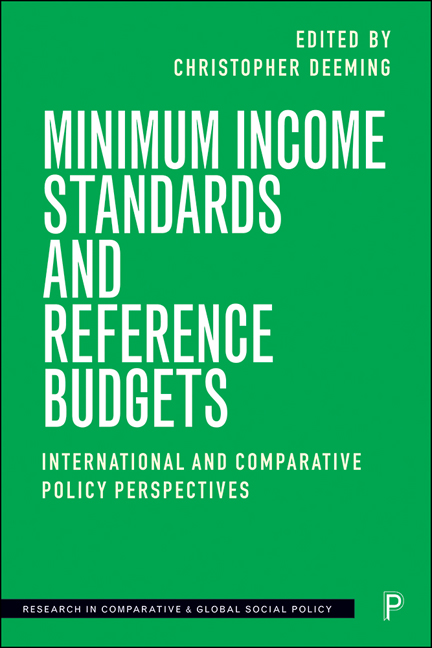12 - Measuring Poverty in the Netherlands: the Generalised Reference Budget Approach
Published online by Cambridge University Press: 12 March 2021
Summary
Introduction
After providing a short overview of the evolution of income arrangements in the Netherlands, this chapter discusses some principles regarding poverty measurement, and how these can be translated into a generalised reference budget approach to poverty. This is illustrated by a presentation of the main findings of its application for the Dutch case. These currently span over three decades of poverty measurement based on administrative data.
History and policy context
In his analysis of the emergence of modern welfare states in Western Europe and the US, De Swaan (1988: 210) aptly described the genesis of the Dutch collective system of income protection as ‘a long sizzle and a late bang’. Before World War II social security evolved slowly, had limited coverage and provided comparatively meagre benefits of short duration. After the war a patchwork of far more generous social insurance and assistance schemes emerged (Van Zanden, 1997; Van Gerwen and Van Leeuwen, 2000). These aimed to make poverty obsolete and to maintain living standards if people faced certain risks. Compulsory unemployment insurance was introduced in 1952, and in the same decade all residents over the age of 65 became entitled to a non-means-tested flat rate ‘people's insurance pension’, which in later years typically was topped up by wage-related mandatory occupational pensions. Similar schemes were established for widows and child benefit. Health risks were mitigated by sick pay, a sickness fund for medical expenses and extensive disability insurances. The last of these covered not only work-related incapacity among employees, but also the risque social (e.g. injuries due to leisure activities) and the wider population (self-employed, early disabled people, housewives). Municipal sheltered employment became available for handicapped people deemed too unproductive for a regular job.
The 1965 Social Assistance Act provided the final safety net. All needy Dutch residents ineligible for social insurance could apply for means-tested income support, at a level sufficient for both the necessities of life and minimal social participation. When the Act was debated in parliament, a Christian-Democrat MP stated that social assistance levels should allow for ‘a cigar and a small bouquet on the living room table, some recreation, and a one-guilder present for the little niece on her birthday’, which has remained a catchphrase for its ambitions ever since (TK, 1962/1963: 3930).
- Type
- Chapter
- Information
- Minimum Income Standards and Reference BudgetsInternational and Comparative Policy Perspectives, pp. 169 - 184Publisher: Bristol University PressPrint publication year: 2020



